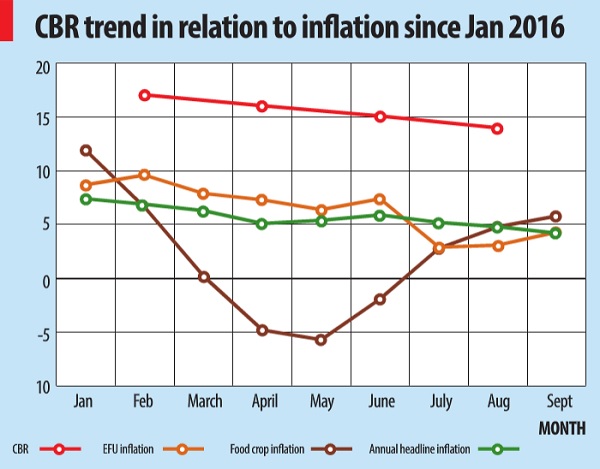
The latest credit rating agency Standard & Poor, which was released last July, maintained the country’s B/B rating as ‘stable’ signaling a favourable macroeconomic outlook for prospective investors. Since the beginning of this year, BoU has been easing the monetary policy cautiously in a bid to stimulate economic activities, cutting the CBR from 17% in February to 16% in April and further reduction in June and August to 15% and 14%, respectively.
But the BoU does not think that the projected inflation will rise above the set medium term target in this year. Adam Mugume, the executive director for research at the BoU, told The Independent in an interview that the current surge in food prices is as a result of weather-related factors, which are temporary.
“These causes are temporary and therefore should not result in a persistent increase in inflation,” says Mugume. “Unless of course another shock such as exchange rate depreciation were to emerge in combination with the weather impact.”
Mugume’s argument is anchored on the fact that there’s relative stability of the exchange rate and demand is subdued and thus hopes that inflation will remain around 5% – the central bank’s medium term target – in the coming months.
Uganda’s inflation band is always at 5%+/- 3%, with an ideal inner band of 5%+/-2%. The bands are reflective of the view that the country’s economy is subject to shocks, such as weather- related, which cause inflation to temporarily divert from the target.
And while mild inflation (3% – 6%) is always desirable for an emerging economy, inflation that is double digits is equally harmful.
As such, Mugume says BoU only tightens monetary policy if it believes that the inflationary pressures over the next 12 months are likely to result in persistent inflation above the 5% target for a prolonged period.
But even as BoU downplays the future outlook, a section of manufacturers believes that the price of food products is expected to escalate further in the coming months.

For example, Kenneth Barungi, the assistant general manager at Kakira Sugar Ltd, told The Independent that sugar firms are producing at diseconomies of scale that has resulted to a surge in production costs and consequently leading to a surge in prices.
“Kakira Sugar Ltd, for instance, is producing at only half of its full capacity because of cane shortage as result of poaching,” Barungi says. “Unless Parliament passes the Sugar Bill, sugar prices are likely to continue rising in the coming months because we need to produce at a break-even.” The proposed National Sugar Bill 2015 that the Cabinet approved in February is set to replace the outdated Sugar Control Act of 1938.
Commenting on the current status of the economy, Ramathan Ggoobi, an economics lecturer at the Nakawa-based Makerere University Business School (MUBS), says since inflation is expected to rise starting next month as food shortage pushes up prices due to the errant rains, there’s need for the government to invest in irrigation as a way of boosting food production.
“For decades now, our inflation has been mainly driven by food shortages due to drought,” Ggoobi says, adding that the government also needs to supply farmers with inputs as early as possible.
Weather experts have predicted a likelihood of little amounts of rainfall over several regions countrywide in the period up to December.
Festus Luboyera, the executive director at the Uganda National Meteorological Authority, said in a weather report on Sept. 08 that most regions of the country are expected to receive total rainfall below normal leading to shortage of water, pastures and food insecurity.
“Communities are advised to use available food and water sparingly to ensure water availability for small scale crop growing. Water harvesting practices are widely advised,” he said, urging the public to engage in planting early maturing crops like beans, upland rice and drought resistant crops that can withstand the little rainfall situations.
****
editor@independent.co.ug
 The Independent Uganda: You get the Truth we Pay the Price
The Independent Uganda: You get the Truth we Pay the Price





